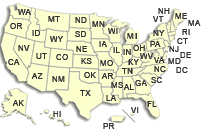The hydrogeologic framework and a reconnaissance of ground-water quality in the Piedmont of North Carolina,
with a design for future study
Water-Resources Investigations Report 88-4130
By Douglas A. Harned
Abstract
The U.S. Geological Survey is investigating the relation of ground-
water quality and land use in the regolith and fractured rock ground-water
system of the North Carolina Piedmont. The initial phase of this study
provides a description of the ground-water flow system and a review of
available ground-water data and formulates hypotheses that guide the design
of a water-quality monitoring network for study of selected areas.
In the Piedmont, the solid igneous and metamorphic bedrock grades
upward into unweathered fractured rock that is covered by a transition zone
of highly-fractured, partially weathered rock, clay-rich saprolite, and the
soil. The fractured bedrock, transition zone, saprolite, and soil make up a
complex flow system.
A review of available ground-water quality data shows a lack of
information about organic compounds and trace metals and changes in ground-
water quality with depth. Land use, soils, and geology significantly
influence ground-water quality.
The hypotheses that need to be tested in the next study phase are:
(1) that ground-water contamination can be related to land use, and (2) that
the transition zone between bedrock and regolith serves as a primary
transmitter of contaminants.
Monitoring of basins containing industrial, urban, residential, and
agricultural land uses in future studies will help define the relation of
ground-water quality to land use. Water quality at different depths in the
flow system and in streams during base flow needs to be identified.
Citation:
Harned, D.A., 1989, The hydrogeologic framework and a reconnaissance of ground-water quality in the Piedmont Province of North Carolina, with a design for future study: U.S. Geological Survey Water-Resources Investigations Report 88-4130, 55 p.
|
For more information, contact |
To order printed copies, contact |
North Carolina Water Science Center
U.S. Geological Survey
3916 Sunset Ridge Road
Raleigh, North Carolina 27607
(919) 571-4000
E-mail
|
North Carolina Water Science Center
U.S. Geological Survey
3916 Sunset Ridge Road
Raleigh, North Carolina 27607
(919) 571-4037
E-mail
|
U.S. Geological Survey
Information Services
Box 25286, Federal Center
Denver, CO 80225
1-888-ASK USGS
|
|
